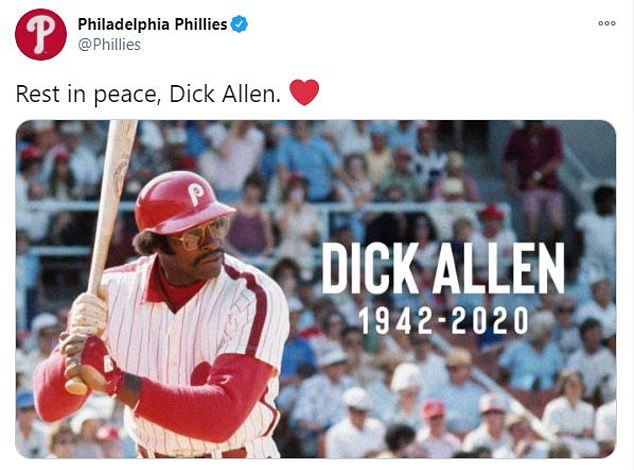
Rest in Peace, Dick Allen, OF-1B-3B for the Phillies, Cardinals, Dodgers, and White Sox, who died yesterday at the age of 78. Allen may be the greatest HITTER who is NOT in the baseball Hall of Fame, other than Barry Bonds. I don't mean to say that he should be there. It's not an easy question to answer.
I knew him when I was a boy as Richie Allen, and there was a story to that, which I wasn't aware of at the time. Nobody called him Richie when he was a kid. Nobody called him Richie when he was a young man. He HATED it. He said it made him sound like a little kid. But for some reason the Phillies organization insisted upon it. I have no idea why they did that, but even after his objections, they were still calling him Richie Allen in 1969, after he'd been with the major league team since 1964, and in the organization since before that. When he finally went to the White Sox in 1972, people called him Dick Allen, which is the way he wanted it. His manager there was Chuck Tanner, also from nearby in PA, and the Allens and Tanner had long been friends. So his three years with the White Sox were mostly -- mostly -- happy ones.
That "Richie" business, though, was typical of how Allen was treated by the Phillies (and others, sometimes), and yes, it had a lot to do with racism. Allen had grown up in a town north of Pittsburgh, where race was not a big deal. In Little Rock, though, which had one of the Phillies' minor league teams, things were a lot different, and it wasn't a whole lot better in Philadelphia. The City of Brotherly Love was notoriously bad for race relations, almost as bad as Boston, which is saying a lot. Strange how that was ... Gene Mauch played him at 3B in 1964, his rookie season, even though he had never played third before. Mauch wanted his bat in the lineup. Allen made 41 errors, and the fans booed him, though he was the team's most valuable player. Fans wanted perfection. Hah. Allen improved considerably over the next year, and Mauch defended his play, but eventually he and Mauch did not see eye to eye, and the Phillies were a notably stingy organization, which did not help matters.
It got to Allen. He began to do things that didn't help him or his teammates: showing up late for games, for example (not that he did it often, but once or twice is enough). Mauch quit, saying it was either Allen or him. The Phillies got sick of Allen, whom they hadn't treated well, and traded him in a seven or eight man deal to the Cardinals for the 1970 season. One of the Cardinals who was supposed to go to the Phillies was Curt Flood. Flood had no intention of playing for Philadelphia, and he refused the trade. That led eventually to the fight between owners and players which went to federal court; and baseball's long exemption from antitrust laws was shot down.
Allen hit well for the Cardinals, but his glove was nothing much, so they traded him pretty much straight up for Ted Sizemore, a rather light-hitting 2B from the Dodgers. So the result was that they had gutted their team after 1969, for Ted Sizemore ... The Cardinals WITH Allen sank 11 games from 1969, and the Cardinals WITHOUT Allen rose 14 games from 1970, for what that's worth. Allen played well for the Dodgers in 1971, but they were ready to get rid of him after one season, and Allen was almost ready to hang up his spikes, when they traded him to Tanner and the White Sox. (It was finally Reggie Smith, another black player who had been treated poorly by his organization -- the Red Sox -- and who had been traded to the Cardinals, where he was happier, who got the Dodgers over the hump. Reggie, too, hated to be called Reggie; his family and friends called him Carl, his middle name. I have no idea why the people in Boston called him Reggie...)
Dick Allen had every bit as much natural talent as anybody who ever played the game: Ruth, Gehrig, Williams, Musial, Aaron, Mays. He was an intelligent and cultured man. Had he played for the Dodgers or the Giants, or for the Cardinals for that matter, with Flood and Lou Brock and Bob Gibson, his whole career might have been different, and he'd be a shoo-in for the Hall of Fame. But he didn't, and he isn't. Bill James wrote that all the black players of that time had to deal with racism and its stupidities. You play the hand you are dealt. Gibson dealt with it by his (public) silence and ferocious intensity, while privately he was the best of teammates. Aaron was like that, too. Don Newcombe dealt with it by taking to drink, which ruined his career. Roy Campanella mainly ignored it. Allen became a clubhouse lawyer, hurting himself most of all, and, in the end, not helping the teams he was on. That too is a part of the player. It does not show up on the scorecard. But it is real. Given the choice between Allen and Reggie Smith, I would take Smith, immediately, every time.
Perhaps it is time to reevaluate his career in its entirety. As I said, it's likely that there's nobody better with the bat who is NOT in the Hall, except for the special case of Bonds the Younger. He was not great with the glove, though I think he could have been if he had felt like it. He hit for power and, in his early years, high average, and he could run. But that does not mean you would want him on your team. The Hall of Fame? Tough call.